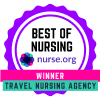Must-Have Skills for Healthcare Travelers
If you are considering a career in travel nursing or healthcare travel, you’re in for an exciting adventure filled with endless opportunities. But what does it take to succeed in the travel healthcare industry? Read on to discover the qualifications and skills you’ll need to navigate a successful travel career.
Healthcare Traveler Skills and Qualifications
Degree and Experience Requirements
In addition to your degree, there are also minimum experience requirements travelers should have before embarking on their first assignment. The amount of experience varies based on specialty or whether you are a travel nurse or an allied healthcare traveler. Be sure to check with your agency of choice to determine if you’ve been working in the field long enough to start traveling.
Remember: Working in healthcare is a big responsibility, and facilities that work with travelers expect that you are not a novice healthcare provider. Getting experience before you travel will help you build confidence in your abilities, receive mentorship from peers and managers, and gain exposure to a variety of patients and situations – all essential to thriving in the travel industry!
TNAA Travel Nursing Experience Requirements:
For most nurse specialties, TNAA requires 1-2 years of experience for our travel nurses. This experience helps nurses establish a good foundation in nursing—you will learn many new skills in your first year as a nurse!
TNAA Allied Healthcare Experience Requirements:
For most allied specialties, TNAA requires one year of experience to travel. However, PT/OT/SLP are open to new grads.
Additional Skills Travelers Need
Aside from your degree and experience in your specialty, you need several “soft skills” to be suitable for the job. These additional skills enable you to interact well with your co-workers, managers, and patients and better form relationships on assignments. Most importantly, they will fuel your success and help you have the best experience in your travel career.

Flexibility and Adaptability
Flexibility and adaptability are more important than ever in the healthcare travel industry. As a healthcare traveler, you’ll often encounter limited resources, increased floating, and frequent relocations. Adapting quickly to new settings and environments is essential for navigating these challenges successfully. Being able to adjust your approach to meet the needs of various employers and situations not only helps you grow personally and professionally but also makes you a valuable team player in a rapidly changing field.
In addition to using these skills on the job, travelers must easily adapt to new living environments. Moving to a new location every few months requires travelers to adjust to new environments and cultures and be open to new experiences.
If you answer “yes” to these questions, you may be flexible and adaptable:
- Do I handle change easily?
- Do I embrace new things, experiences, and processes?
- Do I learn from my experiences and grow?
- Do I adjust my working style to fit my employer’s needs?
- Can I take direction even if it is not the direction I want to take?
- If a new course of action is needed, can I put it into action immediately?

Communication
Effective communication is essential for healthcare travelers, especially since you will be working with a new team every 13 weeks. Good communication can help establish trust between you and your team.
Remember that you communicate in various ways – not just your words. What you say, how you say it, and your body language all convey a message to those around you, so be sure you are being clear in every way. This will help your day-to-day job flow smoothly and help you give the best patient care possible.
It’s also important to know how to “read the room” at every new facility. Get a feel for their workflow, systems, processes, and attitudes so you know what to expect – and better know what is expected of you. Some facilities will be open to hearing how you have done things at other facilities, but some may not.
Beyond communicating on the job, you also need to be able to communicate with your agency and recruiter. Clearly share your career goals, travel preferences, and what’s working (or not!) on your current assignment so your recruiter can better assist you in finding the right jobs that meet your preferences.
If you answer “yes” to these communication skills questions, you may have good communication skills:
- Do I consider who I am speaking to, what they need to know, and how best to express that message before I speak?
- Do I understand how my words, actions, expressions, and body language affect what I am saying?
- Do I try to explain the underlying concepts of what I am communicating?
- Can I explain complex ideas in easy-to-understand ways?
Team-Centric Attitude and Collaboration
A team-centric attitude and strong collaboration skills are vital for healthcare travelers who frequently work with new teams. As a traveler, the expectations are much higher for you than for the staff. Understanding how to collaborate and having a team-centric attitude can go a long way in forming relationships with your co-workers. Travelers who know how to listen, empathize, and understand different points of view can better develop relationships on their assignments. This helps you get along with the staff, and it helps facilitate better patient care, which you are at the center of.
Understand that there will be challenges with staff along the way – but also know that you can do things to help alleviate those challenges. A cooperative mindset not only enables you to succeed in each assignment but also helps you build a reputation as reliable and adaptable, which can go a long way toward your success.
If you answer “yes” to these questions, you may have a team-centric and collaborative attitude:
- Do I actively seek out and value input from colleagues to improve my skills and patient care?
- Am I open to adjusting based on feedback and suggestions from team members?
- Do I try to build positive relationships with co-workers, even when working in a new or unfamiliar environment?
- Am I willing to take on different roles and responsibilities to help achieve shared goals and clinical success?
Love of Travel
This isn’t a skill, but it’s too important to exclude—a love of traveling is essential to thriving in a healthcare travel career. Some travelers consider taking a travel assignment only for the paycheck but are unhappy with moving around frequently. You need to love exploring new cities and seeing new things. After all, the adventure is one of the best parts of the travel experience!
One of the best parts of travel assignments is that most assignment lengths are around 13 weeks, allowing you to fully feel you are living like a local, not a tourist. After all, 13 weeks is a whole season! You will gain a deep understanding of the city, your neighborhood, the best places to grab a coffee or bite to eat, and everything else the local residents love about their home.
If you answer “yes” to these questions, you likely love to travel:
- Am I excited whenever I get the chance to explore a new city?
- Do I have a bucket list of places I’d like to visit?
- Do I like trying new things and immersing myself in new cultures?
- Does the idea of living in new places every few months excite me?
Travel With TNAA
If you lack any of these must-have skills, there is still hope for embarking on a career as a healthcare traveler. You can develop yourself in adaptability, flexibility, communication, and collaboration and learn to embrace a team-centric and collaborative working style.
To improve in these areas, you need self-awareness and a willingness to change. Observe how you interact with others and reflect on areas for improvement. Before you know it, your relationships and career will improve because you have changed for the better.
If you’re ready to embark on your travel career, TNAA is ready to support you on your journey. When you travel with TNAA, you’re traveling with an agency that has your back every step of the way. Housing, credentialing, benefits, sick leave – we’ve got you covered. All you have to do is pack your bags and decide where you’re going.
Ready to get started? Check out our available healthcare travel jobs and apply today!








